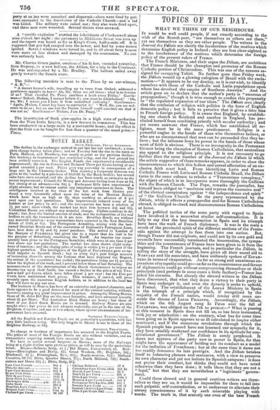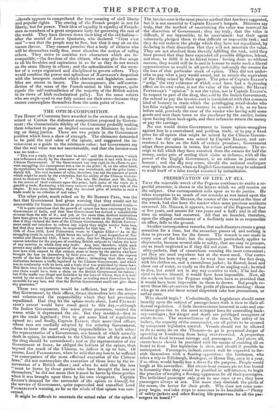TOPICS OF THE DAY.
WHAT WE THINK OF OUR NEIGHBOURS. IT would be well could people, if not exactly according to the wish of the Scotch poet, "see themselves as others see them," yet see themselves as they see other people. The writers in the Journal des Dobats see clearly the incoherence of the motives which determine English policy in Ireland ; they are less clear-sighted as to the incoherence of the motives which determine the foreign policy of the present rulers of France.
The French Ministers, and their organ the Debate, are ambitious that France should be the champion and protector of the Roman Catholic portion of Christendom. This was one of the reasons as- signed for occupying Tahiti. No further gone than Friday week, the Agate wound up a glowing eulogium of Brazil with the excla- mation—" It appears to be our destiny, as it is our wish, to identify ourselves with those of the Catholic and Latin populations upon whom has devolved the empire of Southern America." And the article goes on to declare that the author's party is "amorous of propagandism," though it is wise enough to confine this propensity to "the regulated expansion of our ideas." The Deals sees clearly that the confusion of religion with politics is the bane of English domestic policy ; but it fails to perceive that it gives a false bias to French foreign policy. It is aware that England, by establish- ing one church in Scotland and another in England, has pre- cluded herself from combining priestly with secular authority ; and yet seems unaware that France, which has established all re- ligions, must be in the same predicament. Religion is a powerful engine in the hands of those who themselves believe, or who are so circumstanced that men can be persuaded that they be- lieve ; but the talisman loses its power in the hands of those whose want of faith is obvious. There is an incongruity in the Protestant GU1ZOT being the champion of Roman Catholicism, that neutralizes any appeal to the religious principle. It is not necessary to go further than the same number of the Journal des Dibats in which the article suggestive of these remarks appears, in order to show the inconveniences to which this hollow and unreal affectation of an ex- clusive faith must lead. From identif)iug Latin and Roman Catholic France with Latin and Roman Catholic Brazil, the Debate turns in the same column to rebuke a " Tramontane conspiracy," the object of which is to incorporate more thoroughly the Galilean with the Roman Church. The Pope, remarks the journalist, has himself been obliged to " moderate and repress the excessive zeal" of the clerical conspirators against " the independence and spirit" of " the Gallican Church." So the party represented by the Debate, while it affects a propagandist zeal for Roman Catholicism abroad, is obliged to check and discountenance Roman Catholicism at home.
The political tactics of the same party with regard to Spain have involved it in a somewhat similar self-contradiction. It is folly to say that the late insurrection in Spain and its triumph have been the work of French diplomacy. It was in the main a revolt of the provincial spirit of the different sections of the Penin- sula against the attempt to fuse them into one nation. But, though France did not originate, and could not by its own gold and councils have successfully terminated the insurrection, the sympa- thies and the countenance of France have been given to it from the beginning. The French journals, and in particular the Dellads, in telling the story of the struggle, given all their moral aid to NARVAEZ and his associates, and have uniformly spoken of ESPAR■ TERO in terms of vituperation. As far as strong and unanimous ex- pressions of sympathy could go—as far as the countenance and favour of diplomatists could go without compromising themselves or their principals (and perhaps in some cases a little further)—France has aided his enemies. But already the shrewd writers in the Deltas have discovered, that what they deem a victory to their party in Spain may endanger it, and even the dynasty it seeks to uphold, in France. The establishment of the LOPEZ Ministry in Spain is the triumph of a principle which, if recognized by the majority of the French nation, would render still more un- stable the throne of Lours PHILIPPE. Accordingly, the Dibats, which on the 6th August sung to Pecan over the fall of ESPARTERO, was obliged on the 7th to protest—" What is passing at this moment in Spain does not fill us, as has been insinuated, with joy or admiration : on the contrary, what has for some time been going on in Spain appears to us ill calculated to inspire either sentiment ; and if the numerous revolutions through which the Spanish people has passed have not lessened our sympathy for it, they have sensibly weakened our confidence in its aptitude for con- stitutional government." The Debate is sorely perplexed. It dares not approve of the party now in power in Spain, for that might have the appearance of holding out its conduct as a model for the imitation of Frenchmen ; but at the same time it dares not too readily denounce its late proteges. And the Dgbats betakes itself to balancing phrases and sentences, with a view to preserve its own character and yet not irritate its Spanish catspaws : it does not praise their conduct, but thinks they could not have acted otherwise than they have done ; it tells them that they are not a "legal," but that they are nevertheless a "legitimate" govern- ment.
Could these shrewd and in general cautious writers see them- selves as they see us, it would be impossible for them to fall into such palpable self-contradiction, or to endeavour to alleviate their uneasy consciousness of it by such miserable playing with words. The truth is, that scarcely one even of the best French
_eiberals appears to comprehend the true meaning of civil liberty and popular rights. The craving of the French people is not for liberty, but for power. Their idea of equality is equality of French- men as members of a great corporate body for governing the rest of the world. They have thrown down their king of the old fashion— after the model of Louis Quatorze, who declared "retat c'est moi "—not that the people may be free, but that it may sit on the vacant throne. They cannot perceive that a body of citizens who will be themselves really free, must abandon the notion of ruling others. They strive to combine two characters which are in- compatible,—the freedom of the citizen, who may give free scope to all his faculties and aspirations in so far as they do not trench on the same liberty in others; and the subordination of the mem- ber of a corps organized and disciplined to govern others. They would combine the power and splendour of NAPOLEON'S despotism with the bourgeois comfort which charters and legislative assem- blies are meant to insure. The inconsequence, the self-contra- diction of the mass of the French nation in this respect, quite equals the self-contradiction of the majority of the British nation in its views of Irish ecclesiastical policy. Yet the same writers who are eagle-eyed to our folly cannot see their own—because they cannot contemplate themselves from the same point of view.



























 Previous page
Previous page